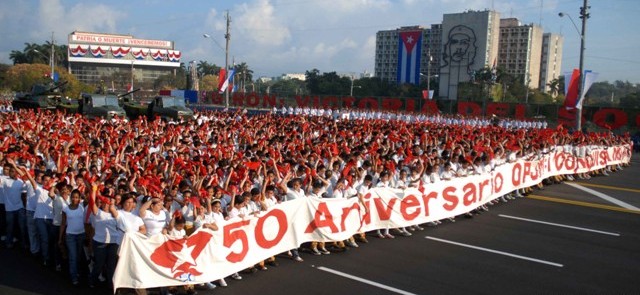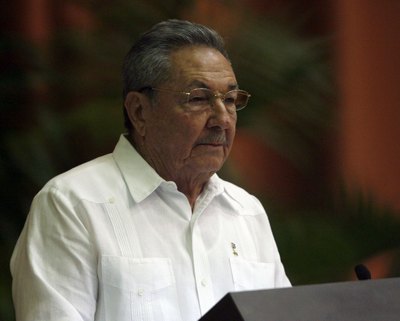|
April 19, 2011 - No. 63
Cuba
Militant Celebration of 50 Years of
Socialism
and Victory at Playa Girón
 José Martí
Revolution Square, Havana, April 16, 2011
José Martí
Revolution Square, Havana, April 16, 2011
• Militant
Celebration of 50 Years of Socialism and Victory at Playa Girón
• Communist Party Holds Landmark 6th Congress
SUPPLEMENT
• Central Report to 6th Congress of Communist
Party of Cuba - Raúl Castro, Second Secretary,
Central Committee
Cuba
Militant Celebration of 50 Years of
Socialism
and Victory at Playa Girón
On the morning of April 16, a military parade and mass
march took place
in Havana to mark the 50th anniversary of the proclamation of the
socialist character of the Cuban Revolution on April 16th, 1961 by
leader of the Revolution Fidel Castro at that very site. The mass
celebration also commemorated the 50th anniversary
of Cuba's historic victory over a U.S. invasion force at Playa
Girón (Bay of Pigs). The ceremony was presided over by Cuban
President Raúl Castro, while hundreds of thousands of Havana
residents, representing the entire Cuban people, also marched through
José Martí Revolution Square. Also
in attendance were the delegates to the 6th Congress of the Cuban
Communist
Party, which opened its proceedings that afternoon.
This militant celebration of a half century of
socialism opened with a salute to the participating troops by Army
Corps General Alvaro López Miera, deputy minister of the
Revolutionary Armed Forces (FAR).
Children, young people and veterans took part in a
symbolic reenactment recalling historical achievements of the Cuban
people, preceding the review of FAR troops and combat weapons.
Tens of thousands of Cuban youth followed the military
parade representing the new generation to whom the celebration is
dedicated and who are the guarantee of the continuity of the Revolution.
A report on the festivities by Radio Cadena Agramonte
noted:
"The replica of the Granma cabin cruiser
sailed on a sea of blue and red neckerchiefs, as if to say that the new
generation will not disappoint those who gave everything so that our
children can grow healthy and happy.
"Like industrious bees, members of the children's
theatre company, La Colmenita, also flooded the emblematic square,
where they displayed in their art one of the most beautiful gains of
the Revolution led by Fidel: which is the full realization of Cuban
childhood.
"The young people also marched on Saturday morning with
a firm and determined step, convinced that the only one path to be
followed is the path to Socialism, proclaimed half a century ago by
Commander-in-Chief Fidel Castro.
"Workers, soldiers, intellectuals, teachers,
scientists, students and other sectors of the Cuban society wrote a
glorious page of patriotism in Havana's historic square, a place that
has been witness to other great events.
"What a splendid reaffirmation today! The blood that
has been shed in the liberation struggles since 1868 until the 20th
century
hasn't been in vain!
"For many reasons the people of Cuba organized in
militias and in other revolutionary organizations faced the invaders in
Playa Girón.
"At such an early moment, only two years after the
triumph of the Revolution, the conviction that no one would surrender
was deeply rooted in the people.
"Thanks to such a resolution, the children of Cuba are
free and the children can reach their most longed aspirations.
"Those who think that they can corrupt our youth and
boycott
the Revolutionary work are completely wrong.
"Maydel Gómez Lago, head of the Federation of
University Students (FEU), thus reminded the pawns of the U.S. empire:
'These youth will never fumble this process!'
"The feeling of attachment to our native land is not
for sale. That's something they should know.
"Nobody surrenders here, and this message was sent
today at Havana's historic José Martí Revolution Square."
Similar activities took place nationwide, paying homage
to the heroes and martyrs of the Bay of Pigs, as well as to demand the
U.S. government release the five Cuban anti-terrorist fighters,
unjustly incarcerated for nearly 13 years for defending
their people and nation against
terrorism.
Leader of the Cuban Revolution Fidel Castro, although
he did not attend the festivities in person, in a Reflection written
that day, paid tribute to the militancy and human warmth expressed at
Revolution Square:
"Today I had the privilege of watching the impressive
parade with which our people commemorated the Fiftieth Anniversary of
the proclamation of the Socialist character of the Revolution and the
Playa Girón Victory. [...]
"I really enjoyed the detailed account of the parade as
well as the music, gestures, faces, intelligence, gallantry and
fighting spirit of our people. I also enjoyed seeing the happy face of
Mabelita, sitting on her wheelchair, and the children and teenagers of
'La Colmenita,' who have multiplied several
times.
"It is worth having lived to watch this spectacle today
and is also worth remembering forever those who died to make it happen.
"This afternoon, during the opening of the Sixth
Congress, I was able to notice in the words expressed by Raúl
and the faces of the delegates to that event, the most important of our
Party, the same feeling of pride."

Communist Party Holds Landmark 6th Congress
The Communist Party of Cuba (PCC) is holding its 6th
Congress from April 16-19, with the presence of Cuban President
Raúl Castro and 997 elected delegates from every province. The
meeting, held at Havana's International Conference Centre, is
deliberating on the Draft Economic and Social Policy Guidelines
of the Party and the Revolution. As part of the broad preparations for
the Congress amongst all sectors of Cuban society, this document was
discussed in thousands of grassroots meetings and enriched with
proposals from the population. Along with the outcome of this mass
consultation, the draft guidelines were
submitted for the consideration of the party delegates. Also on the
agenda is the election of the PCC's leadership bodies for the coming
period.
The 6th Congress of the PCC is of great significance for
the consolidation of the Cuban Revolution. It is the highest leadership
body of Cuban society and the state, and has the responsibility of
organizing and guiding common efforts to build socialism and advance
toward a communist society, Prensa
Latina points out. This Congress comes at a time when all-out efforts
are
underway to renew and strengthen Cuba's socialist economic model and
the Congress will consolidate this work for the coming period.
"According to the statutes of the PCC, with its
ideology based on the ideas of José Martí and
Marxism-Leninism, the Party is the authentic product of the Revolution
and the maximum expression of the united will of the Cuban people, and
nourishes its ranks based on the exemplariness of its members
and with methods for the participation of the masses," Prensa Latina
adds.
Raúl Castro
Inaugurates Sixth Congress
 Following the morning
festivities at Revolution Square,
at 4:00 pm the delegates inaugurated the 6th Congress. Following brief
remarks from Cuban First Vice-President José Ramón
Machado Ventura, Raúl Castro, Second Secretary of the PCC's
Central Committee, presented the Central Report to the
Congress. Following the morning
festivities at Revolution Square,
at 4:00 pm the delegates inaugurated the 6th Congress. Following brief
remarks from Cuban First Vice-President José Ramón
Machado Ventura, Raúl Castro, Second Secretary of the PCC's
Central Committee, presented the Central Report to the
Congress.
Raúl said, "The process of discussing the
guidelines proved the capacity of the Party in leading a serious and
transparent dialogue with the population, regardless of the simplicity
of the theme."
"Unity among the people and their
confidence in the Cuban Party and our Revolution was put to the test.
Unity does not mean people can not have different opinions on the most
diverse issues," Raúl added.
Raúl asserted and pointed to the countless
additions, modifications and changes to the draft guidelines proposed
by the people in the public debates and meetings held nationwide since
December 2010.
"We could say that the Congress already started with the
broad debates in which our people participated actively.
"Although the meetings were characterized by our
people's understanding and support, there was not unanimity, as
different and equally valid opinions were expressed at those meetings.
This is very important.
"This is exactly what we wanted to achieve. It is
precisely this what you can expect if you aim to hold a truly
democratic, open consultation with the people on key, important issues
that affect us all alike," the Second Secretary said.
Raúl explained that once approved by the
Communist Party at the 6th Congress, the new guidelines for the
country's economic and social policy do not become law, since they are
only the recommendations of a political force.
Raúl said, "It is the duty of the government and
the country's legislative assembly to take the necessary measures and
make the necessary arrangements and changes to the specific laws and
regulations for the full implementation of the new guidelines.
"In this sense, the permanent commission of development
and implementation will work closely with the pertinent government
bodies and agencies towards this aim."
Five Working Commissions
On the second day of the Congress, examination of the
Central Report and the Draft Economic and Social
Policy Guidelines was the focus of delegates' attention. Vice-President
Machado,
explained on the first day of the Congress that in order to make the
most
of the three days of discussions at the Congress, delegates would work
in commissions to guarantee that all everyone would have the
opportunity to speak and express their opinions.
 Delegates met in five
commissions to address different
aspects of the policy. They had previously discussed the draft at
the provincial level for three days. Delegates met in five
commissions to address different
aspects of the policy. They had previously discussed the draft at
the provincial level for three days.
The First Commission discussed concerns regarding the
economic management model as detailed in the Central Report, which
ratified socialist planning as key for the country and its
leadership.
The Second Commission discussed the overall economic
aspects of proposals, such as the establishment of a credit policy to
fundamentally ensure those activities that stimulate domestic
production and generation of foreign exchange.
The recognition of the social achievements of the
Revolution was discussed by the Third Commission, reviewing the
improvement in quality and sustainable reorganization of social
services provided to the Cuban population.
Commissions 4 and 5 examined the sections referring to
the various productive and service sectors. These included all the
issues needed to increase the functioning and efficiency of industrial
plants in the country, assessing the needs of the national economy and
the care and protection of the environment.
The work of the Commissions will be presented for
approval in a plenary session.

Website: www.cpcml.ca
Email: editor@cpcml.ca
|

